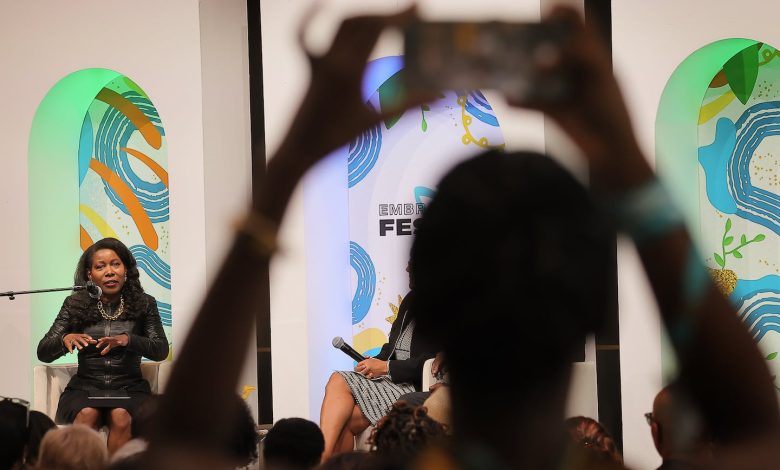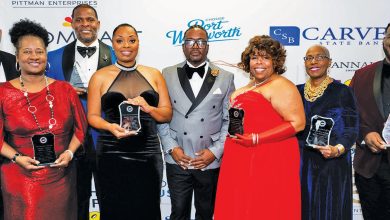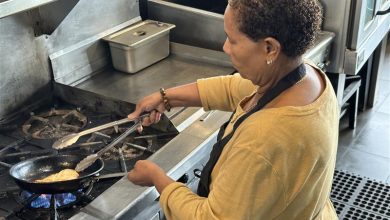Insights from Embrace Ideas Festival

Margaret Breeden, daughter of Boston civil rights leader Rev. James Breeden, who protested educational inequalities in the 1960s, was one of the attendees. Breeden said she attended the event to learn more about how she could get involved in racial justice efforts in Boston.
“My parents really ingrained social justice in me every day at the kitchen table, so I came here to figure out what I could do to help,” she said.
In the first panel of the day, State Senator Liz Miranda and Segun Idowu, chief of economic opportunity and inclusion for the City of Boston, discussed how they were using government policy to uplift Black Bostonians in light of the new presidential administration. Miranda represents the 2nd Suffolk district, which includes parts of Roxbury, Mattapan, Dorchester and Northeastern University or “the Blackest district in the Commonwealth” in her words. Idowu, a member of Mayor Michelle Wu’s cabinet, led a grant program that helped Boston businesses recover from the pandemic.
Idowu said Trump’s tariffs and executive orders would impact the “five pillars” of Massachusetts’ and the city of Boston’s economy — medical institutions, educational institutions, life science research, tourism and climate technology.
Idowu also said Trump’s tariffs were impacting community projects in the city like the P3 project, a plan to build affordable housing and a research lab on the site of a vacant lot in Roxbury.
Miranda was critical of the Trump administration’s rollback of diversity, equity and inclusion policies. She said Trump’s actions would hurt sectors like medical research.
“It’s not just symbolic, it’s sidelining brilliant people,” Miranda said.
Miranda also said that even when DEI policies were not under attack, Massachusetts’ government was not representative.
“I’m one of four Black women in the entire Legislature of 200 people … we’re not even represented in the bluest state in the country,” Miranda said.
Miranda encouraged attendees to boycott companies that rolled back DEI efforts and to contact their alma maters if the institutions were abandoning programs to foster diversity.
The politicians also told the audience policy wins they’re proud of. Miranda said that she’s proud of a bill she passed last year that addresses the higher morbidity rate that Black mothers face compared to white mothers.
“Six years ago when I first started talking about this issue, everyone told me ‘there’s no problem here,’ here in the public health Mecca of the world,” Miranda said sarcastically.
Idowu said that he felt proud that people of color have started businesses in almost every neighborhood in the city and no longer feel limited to Mattapan, Dorchester and Roxbury.
“The whole city belongs to us … we can go to establishments in other neighborhoods now and not feel policed,” Idowu said.
Priscilla Douglas, an executive coach and author who recently stepped down from the board of the Boston Public Library, attended the Embrace Ideas Festival. She is a lifelong resident of the city who went to Northeastern University and worked at the Roxbury YMCA and the Urban League growing up, but said the festival was eye-opening.
“Listening to the policy panel, I had no idea that 17 percent of Boston residents live in poverty,” Douglas said.
At the last panel of the day, Jeneé Osterheldt, deputy managing editor for culture, talent and development at The Boston Globe, interviewed entrepreneur Morgan DeBaun about her new self-help book and her career. DeBaun is the founder and CEO of Blavity Inc., a digital media company geared to Black millennials.
DeBaun said she had the idea to start a company focused on Black people when she was working for Intuit in Silicon Valley because she didn’t see anyone building technology with Black users as the primary customer they were targeting. DeBaun, who is originally from Missouri, said the murder of Ferguson teenager Mike Brown at the hands of the police in 2014 also led to her wanting to work with Black people.
“I was sitting in a cubicle in San Francisco after Mike Brown and the people around me were asking ‘what’s for lunch,’ they just were not seeing what I was seeing,” DeBaun said.
In the audience, Laurie Nicolas resonated with DeBaun’s experiences of working in predominantly white offices. Nicolas works in the healthcare space but started her own nonprofit called Pink Sunday which focuses on physical fitness for women. Nicolas learned about the Embrace festival after the inauguration of the Embrace statue in Boston Commons in 2023. She said she appreciated the diversity of the speakers at the festival.
“I want to focus on cultivating spaces where people feel included, not just people who look like me, but all kinds of diversity and I learned a lot from this event,” Nicolas.
This story was produced by the Globe’s Money, Power, Inequality team, which covers the racial wealth gap in Greater Boston. You can sign up for the newsletter here.
Angela Mathew can be reached at angela.mathew@globe.com.




